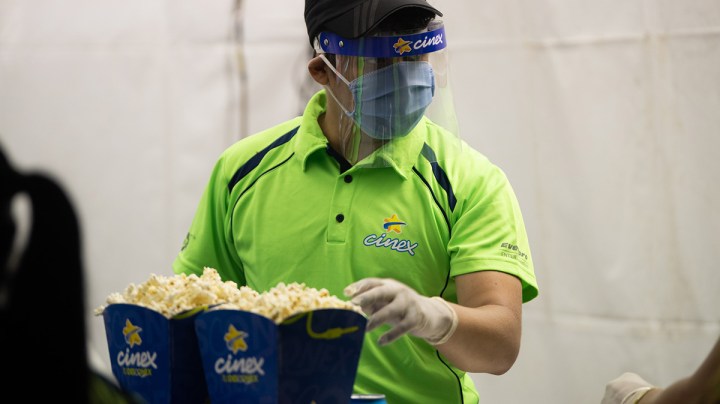WHO Warns Latin America Might Be Reopening Too Quickly & More in Today’s News

A drive-in employee distributes popcorn and sodas in the parking lot of the Metropolitan University on July 3, 2020 in Caracas, Venezuela. Photo by Carolina Cabral/Getty Images
Las Notis is a daily news column that gets you up to speed on the political, media + other goings-on in the United States, Latin America, and the diaspora—all in one quick digest.
Here’s your glimpse at what’s going on today:
- According to anonymous sources and internal documents obtained by the New York Times, controversial guidance on the Centers for Disease Control and Prevention website that said it was not necessary to test people without symptoms of COVID-19, even if they had been exposed to the virus, were not written by CDC scientists. The reports allege that CDC scientists seriously objected to the language, but it was posted despite their concerns.[NYT]
- The White House is expected to announce a disaster relief package for Puerto Rico, three years after Hurricane Maria. According to CBS reporter David Begnaud, Senate Minority Leader Chuck Schumer and Rep. Nydia Valesquez shared that a $10 billion package was approved to rebuild the Puerto Rico Electric Power grid. Trump had previously downplayed the crisis on the island. [Business Insider]
- U.S. lawmakers have introduced a bipartisan bill in honor of Vanessa Guillen, the U.S. Army soldier who was murdered in Fort Hood. The bill is designed to change how sexual assault and harassment claims are reported and handled within the military.[CNN]
- World Health Organization regional director Carissa Etienne warned on Wednesday that despite the fact that countries in Latin America are reopening and resuming normal activities, the pandemic still requires major precautions and interventions, particularly as cases continue to increase in several countries. “We must be clear that opening up too early gives this virus more room to spread and puts our populations at greater risk. Look no further than Europe,” she said.[Reuters]
- Bolivia’s interim president Jeanine Áñez has exited elections, currently scheduled for October 18. Añez, who took office less than a year ago, indicated that she did not want to split the vote and see the country led by the party of former president Evo Morales, who was ousted last November. [BBC]
- ICE officials reportedly lied to get an undocumented Indonesian immigrant out of his home on the grounds of a Methodist church and then transferred him to a detention center. The man had been previously detained by ICE, who had placed an ankle monitor on him. When ICE agents arrived at his house, they said they only needed to check his ankle monitor. Once he was outside, he was arrested and is now awaiting deportation. [WaPo]
- Ricardo Valderrama, an anthropologist who fought for Indigenous rights as mayor of Cusco, passed away recently at the age of 75. The scholar had authored dozens of books and articles that covered peasant uprisings and colonization, and he helped lead the fight against COVID-19 in his community before dying of the virus. [NYT]
- The Miami Herald is under fire again for a Spanish-language insert that was included in its papers that said American Jews support “thieves and arsonists” and compared Black Lives Matter protesters to Nazis. “It is one of a series of internal failures that we are investigating in order to prevent this from ever recurring,” the paper’s editors wrote. Three weeks ago, the paper apologized after Armando Salguero criticized athletes for standing against systemic racism. [NBC Latino]
- Indigenous protestors–members of the Misak community–overturned a statue of Spanish conquistador Sebastián de Belalcázar in the south western city of Popayán, Colombia. The equestrian figure de Belalcázar, who founded the city in 1537, represents “five centuries of genocide and slaver.” While the police looked on as the protestors used ropes to tear down the figure, Popayán’s mayor said it was “an act of violence against a symbol of a multicultural city.” [BBC]